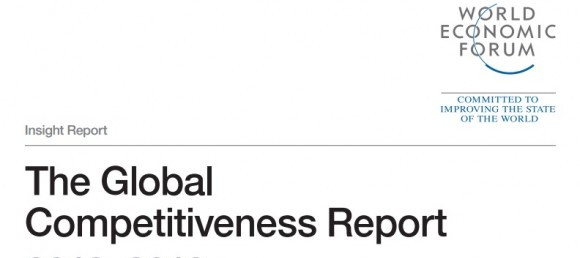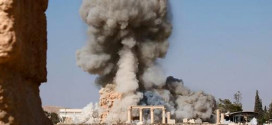The World Economic Forum has released its latest report, The Global Competitiveness Index, an annual report which ranks countries according to how well they are able use resources available to them in an effective and productive way.. The Global Competitiveness Index also measures how the institutions, policies, and factors in a country affect economic prosperity in current and medium-term levels.
The report ranks nations according to calculations from data in twelve categories – institutions, innovation, macroeconomic environment, health and primary education, higher education and training, goods market efficiency, labor market efficiency, financial market development, technological readiness, market size, business sophistication and innovation.
This year, the report highlighted that the biggest challenge in Middle East economics is job creation. The report also mentioned that the main factors that limit competitiveness in the region are underdeveloped skills, weak institutions and labor market inefficiency.
According to the report, the best ways to improve economies are institutional reform and investment in education; it also identified a number of areas where leaders could give priority to reform, like increasing job creation and private sector expansion. The report also noted that weak institutions and labor markets in North Africa, weak infrastructure and institutions in the Levant, and a pervasive education and innovation gap in countries in the Gulf are the most significant areas for improvement.
The report divided the Arab World economies into two categories – the first category containing nations that suffer from political instability as a result of the Arab Spring (Egypt , Yemen, Tunisia, Libya ) , and the second category containing oil rich countries ( Saudi Arabia, UAE, Kuwait, Oman , Bahrain ).
Qatar, Saudi Arabia and UAE were among the top 20 countries in the world; Jordan was one of the countries that improved its performance significantly.
Among energy-rich economies, Qatar is the most competitive economy in the region at 13thposition.The country’s institutional framework rank is 4, its macroeconomic environment rank is 6, and it efficient goods market rank is 3. Low levels of corruption and undue influence on government decisions, high efficiency of government institutions, and strong security are the cornerstones of the country’s solid development.
The United Arab Emirates moved up in the rankings to take second place in the region at 19th. The high oil prices had a positive impact on the country’s budget and allowed it to reduce public debt and raise the savings rate. The country has also adopted technologies which contributed in enhancing the country’s productivity. Overall, its infrastructure rank is 5, and efficient goods markets rank is 4. Its macroeconomic stability rank is 7, public trust in politician rank is 3 and government efficiency rank is 9.
Saudi Arabia remains rather stable with a small drop of two places to 20th position overall. The country has seen a number of improvements in recent years, which has resulted in more efficient markets and sophisticated businesses. Its macroeconomic stability it rank is 4. Despite that high rank, its health and education do not meet the standards of other countries at similar income levels, and visible progress in health and primary education is still being made at a low level.
Among Arab spring countries, Tunisia places 83rd in this year. The country’s position reflects on important challenges Tunisia will have to face in order to improve its economy and resolve its daunting unemployment problem. The country currently is at the very low rank of 132 on the labor market efficiency pillar. Additionally, financial markets in the country do not efficiently fulfill their role in providing the business sector with financial means to grow. Moreover, the banking system at present is ranked a low 129.
Egypt drops by 11 positions to reach 118th place in this year’s GCI. This assessment is likely influenced by the country’s continued transition since the events of the Arab Spring. The security situation and the political instability are undermining the country’s competitiveness and its growth potential to move forward. Resolving political friction still remains the top priority in the country currently.
The rest Arab countries mentioned in the report are:
Oman – 33rd
Kuwait -36th
Bahrain- 43rd
Jordan- 68th
Morocco -77th
Algeria -100th
Lebanon -103rd
Libya -107th
Yemen (ranked last in the region) –145th
 The Arab Democrat The Latest From The Arab World
The Arab Democrat The Latest From The Arab World





